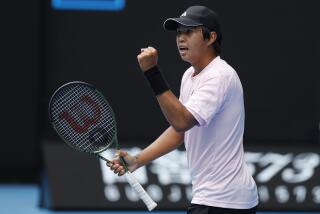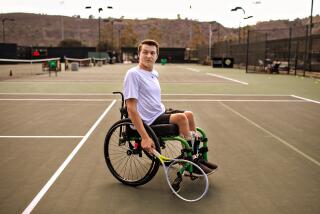THIS YEAR’S MODEL
- Share via
APTOS, Calif. — Phil Dent has an endless list of metaphors for his son Taylor’s tennis game. But the most appropriate one this night, in the first round of the $50,000 Aptos Challenger, involves a sports car.
“It’s like driving a Ferrari,” said Phil Dent, a top 10 professional player in the 1970s. “If you’ve been driving a VW your whole life, then all of a sudden you step into a Ferrari, you don’t know how to change the gears.
“Sometimes he takes the curves smoothly. Sometimes he spins out.”
Taylor Dent, a 17-year-old from Newport Beach, was coming out of one of his more violent spin-outs, a second-round loss at the Wimbledon junior championships, and he was on the verge of another against Mexico City’s Marco Osorio, ranked 345 on the ATP computer.
Just before crashing, Dent downshifted his high-octane game into second gear and beat Osorio, a 25-year-old counter-puncher, in this small town eight miles south of Santa Cruz.
“It’s just a little mental adjustment when the shots aren’t falling,” said Dent, who at 6 feet 2 and 190 pounds dwarfed the 5-foot-6 Osorio. “That’s why I needed the loss at the Wimbledon juniors to learn that I don’t have to play perfect tennis. I didn’t want to have to win ugly. But [against Osorio], I just accepted the fact that I can’t be perfect out there.”
Dent, who won USTA national titles in 1995 and ‘96, is also accepting the fact there isn’t much more for him to learn or accomplish as a junior player. For that reason, he’s skipping next month’s prestigious boys’ 18 National Hard Courts in Kalamazoo, Mich.
In fact, the U.S. Open junior championships probably will be his last amateur tournament.
This weekend at the Mercedes-Benz Cup qualifying tournament at the Los Angeles Tennis Center, tennis fans can catch a glimpse of the player some feel can help pull American men’s tennis out of its doldrums.
Dent isn’t putting that kind of pressure on himself, but he is aiming high. His ranking jumped from 730 to 649 after the Aptos Challenger, where he lost to 138th-ranked Cristiano Caratti from Italy in a third-set tiebreaker in the second round.
“It doesn’t burn in me that American tennis is supposedly in a slump,” Dent said. “If I’m good enough to be the next American superstar, great. Fantastic. But mainly I’m out there for myself.”
Tom Gullikson, U.S. Davis Cup Coach and USTA director of coaching, has been closely monitoring Dent’s progress.
“Taylor is one of the key young players in the United States,” Gullikson said. “He’s clearly on track to be a fine pro. He’s got a big game. He can dictate points. To be a good pro, you need a big weapon, and Taylor certainly has that in his serve.”
This spring, Dent took the first step toward becoming a pro by signing a letter of intent with International Management Group. Phil Dent said agents have been trying to get a piece of his son for two years.
“It was becoming out of hand,” Phil Dent said. “This wasn’t his decision. It was a lot more mine. It was for his peace of mind.”
Not to mention that it would give Taylor some financial stability when he starts playing the tour full-time. The IMG contract could also help secure wild-card invitations to regular tour events until Dent gets his ranking high enough to earn them on his own.
If it seems as though every move Phil Dent makes regarding his son’s tennis career is calculated, it is.
Taylor Dent didn’t begin playing tennis until he was 11, but he knew by 14 that he wanted to win Grand Slams. At that time, his father drew up a plan to prepare Taylor for the grueling ATP Tour.
“He wanted to do it and I wanted to give him a chance to do it,” Phil Dent said.
It probably wasn’t by mistake that Taylor Dent became a tennis player. His mother, Betty Ann Grout, was a top 20 player during the 1970s and 1980s. Phil was an Australian Open singles finalist in 1974, a French Open semifinalist in 1977 and a member of the Australian Davis Cup team for eight years. Taylor’s stepbrother, Brett Hansen, played collegiately for UC Irvine and USC and spent three years on the tour.
“He was pretty much of a natural,” Phil said. “Even his serve, we didn’t spend much time on it.”
When Taylor was 12, Phil and Betty Ann divorced. Betty Ann Grout, remarried and now living in San Diego, said she has been impressed with Taylor’s ascent as a tennis player.
“Phil’s done a great job,” she said. “Phil’s a genius as far as strategy on the court. I think Taylor developed a lot of his own strokes. He’s got that Western grip. He’s got a lot more topspin than Phil had, but his volleys are similar.”
Grout said she has no problem with her son pursuing a pro tennis career.
“If you’re that good, why work hard?” she said. “Why not play tennis for a living? He’s strong. He’s smart. He’s got a lion’s heart. He wants it and he’s gorgeous. What else is there? And his dad wants it for him. How many kids have all that going for them?”
Not many. And not many kids who pursue pro tennis careers have fathers with Dent’s tennis resume.
“People ask him if it’s hard hanging around with your dad all the time,” Phil said. “He understands it’s more of an advantage than a disadvantage. I’m in a fortunate position that I know anyone who is in tennis. It’s been a great experience for me to be able to do this.”
Taylor experienced high school at Corona del Mar for a year. That year, he became only the third freshman to win the Southern Section Individual singles title--the other two were Pete Sampras and Rick Leach. That fall, Dent began taking independent study classes. Last month, he graduated from Monte Vista public school in Costa Mesa a year ahead of schedule.
For most kids, the next step is college. But college was never part of the Dents’ master plan.
“I struggled with high school,” Taylor said with a chuckle.
Dick Leach, who coached Brett at USC, thinks Taylor is making a mistake by turning pro at 17.
“I think he would do well to go to college for a year, or even two,” said Leach, who saw Dent’s three-set loss in the Wimbledon juniors to Greece’s Vassilis Mazarakis. “The level of play in college tennis is tremendously high. He’s still not ready for the ATP tour. I don’t know how fast he’s going to be, but there are an awfully lot of fast players on tour. Taylor’s a big kid. I hope he doesn’t get any bigger.
“What happens if it doesn’t work out? I don’t know what the hurry is. What’s wrong with having something to fall back on? The satellites can get old in a hurry. But if Taylor wants to do it, that’s important too.”
Gullikson said the Dents’ choice isn’t necessarily a bad one.
“There are many different paths to pro tennis,” said Gullikson, who played against Phil Dent on the tour. “Courier, Chang, Agassi and Sampras all turned pro early. They clearly made the right decision. Others like Todd Martin and Mal Washington played college and that worked for them.”
Financing his son’s tennis career has not been easy, but the USTA has eased Phil Dent’s burden by taking care of Taylor’s travel expenses and helping pay trainer Ken Matsuda, the Dents’ newest traveling companion. Matsuda, a former USC assistant track coach, has worked with many top pro players, including Chang, Courier and Tracy Austin.
Dent said Matsuda has been a great addition.
“He gives Taylor and I a break from each other,” Phil said. “He’s very good for Taylor, not only training, but helping Taylor mature. Anyone who’s had kids knows, there’s just some things kids just don’t listen to. It’s having another voice. Taylor’s becoming his own man.”
That maturity has translated into victories. This year, Dent reached the quarterfinals of the Australian and French Open junior championships and the finals of the Roehampton junior championships--a pre-Wimbledon junior grass-court tournament. In April, Dent won the doubles and reached the singles finals of a satellite Futures tournament in Mt. Pleasant, S.C.
“He’s as good as any junior in the world, which is amazing to think about,” Phil Dent said. “But I don’t think he’s ready yet for the big guys. If you rush him, you can kill him off.
“He’s taken a long time to understand he has to go through a learning process. The game is so much more competitive than it was 10 years ago, when Sampras was coming up. The level of tennis at Challengers is incredibly high. Unless you’re out there, you don’t realize the 700th-ranked player in the world is pretty good.”
Taylor was eager to start playing the pro satellite circuit full-time a few years ago, but he realizes now his dad was right.
“It would have been foolish of me to turn pro because I still needed the junior tournaments,” he said. “I lose one way. That’s because of my head.”
More to Read
Go beyond the scoreboard
Get the latest on L.A.'s teams in the daily Sports Report newsletter.
You may occasionally receive promotional content from the Los Angeles Times.










